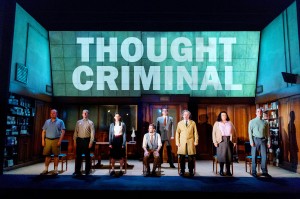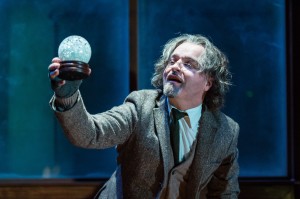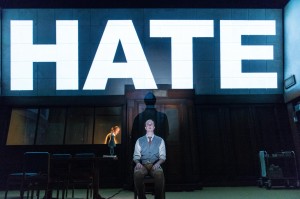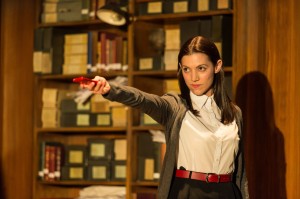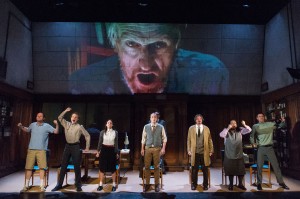THAT WAS THE YEAR THAT IS,
OR ALL’S ORWELL THAT ENDS ORWELL
When the meek and paranoid everyman Winston Smith scribbles “Down with Big Brother” in his journal, he soon blossoms into a determined and impassioned rebel. But taking a stand in the dystopian superstate of George Orwell’s sadly timeless 1984 hardly creates the happy endings we see in today’s books, films, and plays in which the underdog overcomes the hierarchy. In Orwell’s 1949 novel of ideas, the future is dismal for all–including Winston–because the present involves destruction of our language, people who barely look up from their telescreens, perpetual war, intrusion of privacy, Thought Police, and systematic torture. Sound familiar?
The main thing you will come away with in this thrilling but distancing theatrical version by Headlong Theatre of Britain is the prescience of Orwell. While we live in a free land, totalitarianism exists in many forms: consumerism, religion, mass media, etc. While working at the Ministry of Truth, where the truth is constantly rewritten until any actual truth is unrecognizable, Winston meets another subversive, Julia (Hara Yannas), with whom he begins a love affair in a rented room at an antiques shop in a proletarian neighborhood. When captured by the Thought Police, Winston is interrogated by O’Brien (Tim Dutton), who Winston had believed to be a member of The Brotherhood, a cabal that wants to bring down the Party.
The brutal final scene of realistic torture (the front row is inches away from needing protective ponchos from splattering blood) certainly cements our hyper-awareness of the novel’s warning about totalitarian regimes, ubiquitous government surveillance, and public manipulation. But since there was little to no opportunity given to us to connect with the characters, we are, in the end, as emotionally disconnected, despondent, distressed, and drained as the brainwashed inhabitants of Oceania. Which leaves me to wonder what director/adapters Robert Icke and Duncan Macmillan wanted their viewers to come away with.
The style here is textbook Epic Theatre, popularized in Germany after WWI. Techniques similar to those used by directors like Max Reinhardt and (especially) Bertolt Brecht are everywhere at the Broad Stage: mannerisms and repeated actions sum up characters; there are sudden shifts in time and place; the action (especially between Winston and Julia) is broken up into open-ended episodes; aphorisms (WAR IS PEACE, FREEDOM IS SLAVERY, IGNORANCE IS STRENGTH) are projected during scenes; and one actor directly addresses the audience. Above all is the glorious theatricalism, not just in the riveting performances (which are fortunately not distancing as in Epic Theatre) but in Tom Gibbons’ jarring sonic sounds and Chloe Lamford’s design of dull grays, browns, and greens–colors which suggest 1930’s Germanic Expressionism.
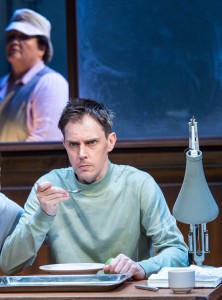 For Brecht, these tactics were means to an advisory end. He wanted audiences to maintain the emotional objectivity necessary to learn the truth about their society. In doing so, viewers would learn to criticize the society seen onstage in Epic Theatre. The idea was to change society by changing the way people thought.
For Brecht, these tactics were means to an advisory end. He wanted audiences to maintain the emotional objectivity necessary to learn the truth about their society. In doing so, viewers would learn to criticize the society seen onstage in Epic Theatre. The idea was to change society by changing the way people thought.
But in today’s media onslaught, we need something that this production lacks: Connection to the characters. As played by the magnetic and vulnerable Matthew Spencer, we can’t help but have great sympathy for Winston, but instead of feeling bad for him, I simply felt clobbered by the brutality of it all. I loved how characters would disappear like magic, and the use of multi-media (video work by Tim Reid), but once the theatrical magic wore off, especially during scenes between Julia and our hero, the action kind of lost me.
It is no accident that this 1984 has been touring Great Britain for nearly three years with great success; it truly is gripping stagecraft. Icke and Macmillan have successfully taken a novel of dense ideas and translated them into fairly cohesive storytelling that also involves a future book club chatting about Winston’s journal (a book club which may or may not be in Winston’s head, just as Oceania may or may not exist). I found myself drifting from the dense nature of the project, and hoped that our adapters could have figured out a way to make the relationship between Winston and Julia more palpable so that the ending was not just harrowing but emotional.
Orwell was sending a message about the extent to which totalitarian rule can destroy the human spirit. It’s a bit overwhelming and depressing. I recognize that war will never go away, but while this recommended thinking-man’s theatre may not propel you to activism, it may have you reconsidering, if nothing else, how we are destroying language and staring at screens far too much to notice what’s happening right in front of us. Corporate America is watching you.
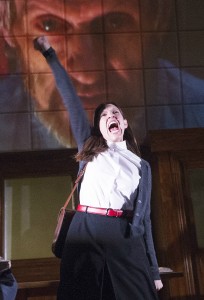 photos by Manuel Harlan and Tristram Kenton
photos by Manuel Harlan and Tristram Kenton
1984
Headlong Theatre Company
The Eli & Edythe Broad Stage
1310 11th St in Santa Monica
ends on February 6, 2016
for tickets, call 310.434.3200 or visit The Broad
North American tour ends on April 10, 2016
for more info, visit Headlong

